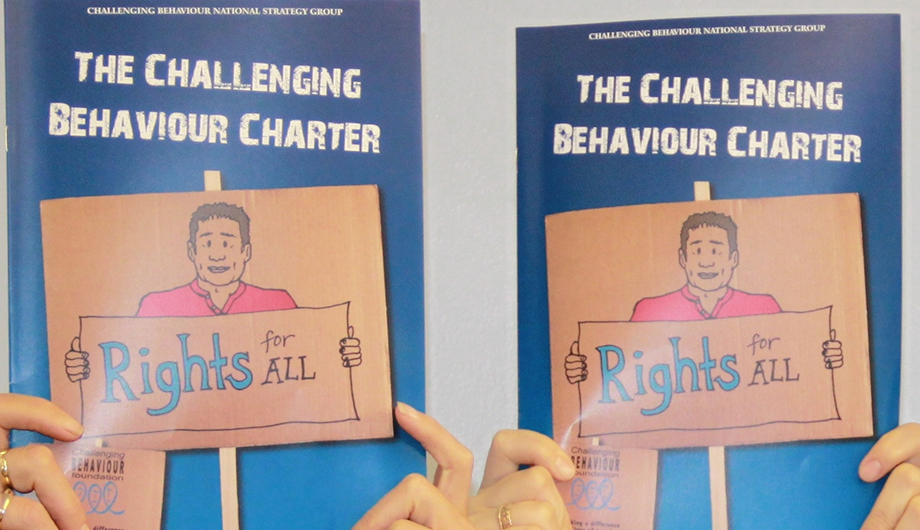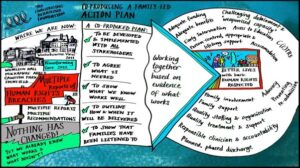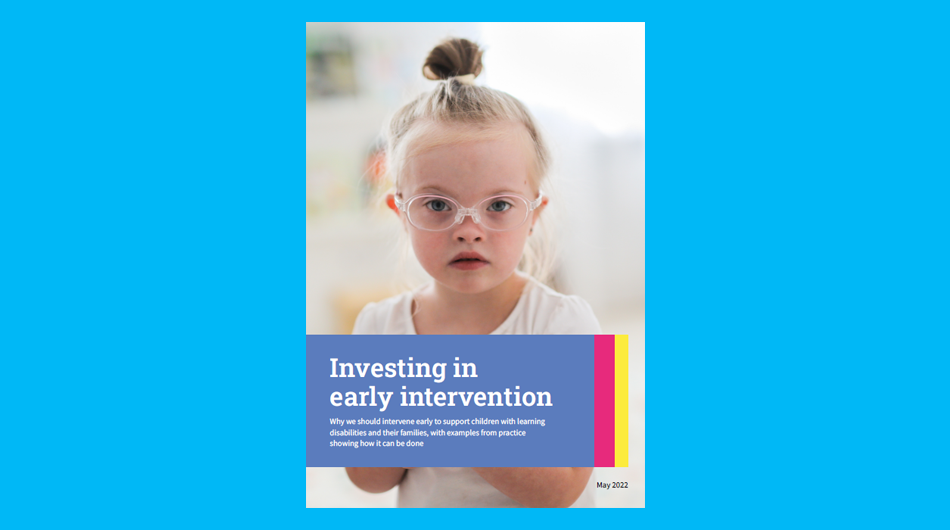
Challenging Behaviour Charter
The Challenging Behaviour Charter sets out the rights of the people with learning disability and the action that needs to be taken. Find out how to sign up.

Here you can read a summary of our November 2022 CB-NSG meeting, held virtually, with links to the workshop templates, write-ups, and actions
The Challenging Behaviour National Strategy Group meeting, ‘Co-Producing Actions to Transform Care for People with Learning Disabilities’, was held virtually on November 24th 2022.
The meeting began with a welcome by Viv Cooper OBE, CEO of the Challenging Behaviour Foundation (CBF), who shared that the main aim of the meeting was to co-produce a detailed action plan, built on evidence-based practice, that will deliver good outcomes for people with learning disabilities. Dave Williams (Head of Service – Learning Disability, Transition and Sensory Service at the Northern Care Alliance) then gave an overview of the history of the Transforming Care and Building the Right Support programmes, as well as the issues that had been identified with the Building the Right Support (BTRS) Action Plan that had been published in July 2022.

Graphic by Pen Mendonca @mendoncapen
There were then two presentations from family carers, sharing their relative’s story and the issues that they and their relative have faced, as well as what actions would improve things.
In the first presentation, the family carers shared that there wasn’t suitable support (in particular psychological support and respite) available in their local community for their son. This resulted in him being detained in different hospitals, including Winterbourne View Hospital where he suffered trauma and didn’t have access to therapeutic support. A key issue their son faced was the issue of funding: prior to his first admission, there hadn’t been suitable community support available and they had been unable to get the support he needed. Subsequently, funding which they had been assured was ring-fenced was cut- funding only became available following crisis and detainment in a forensic hospital, rather than before (when it could have helped prevent admission).
The second presentation focused on how, despite the laws, guidance, and knowledge available, people with learning disabilities are still being failed by the system. Despite the number of reports and recommendations saying the same things about what is needed, people with learning disabilities are unable to access the support they need, and consequently end up being detained in inpatient units where they are subject to neglect, abuse, restraint, seclusion and segregation. This presentation finished with a reminder that human rights need to be applied and upheld equally, and that action, rather than more reports, is what is now needed.
There were 8 morning workshops, which focused on developing the actions needed in different areas to provide the right support in the community and to prevent people with learning disabilities being inappropriately detained in inpatient settings.
These workshops developed a number of actions and initial ideas of what would be needed to ensure the right support for people with a learning disability and their families. As part of this, attendees were asked to think about who would need to act and to carry out each action. These action tables show what was discussed and the initial ideas/identified areas where work needs to be done.
Since the CB-NSG meeting, we have been working together to refine these ideas and turn them into clear, deliverable actions. This has included thinking further about how these actions can be delivered, who can deliver them and whether any parts of the broader actions can be delivered or taken forward by CB-NSG members. At the next CB-NSG meeting in June 2023, a wide range of stakeholders will build on this work and agree how actions can be delivered and embedded in a long-term, sustainable way.
If you are interested in contributing to this work, please get in touch by emailing actionplan@thecbf.org.uk
Facilitators: Alison Branch and Jackie Clarke
This workshop focused on how clinicians working with people who have learning disabilities and behaviour that challenges can create positive change and overcome barriers to high-quality care. Attendees discussed:
Facilitators: Clive Parry and Isabelle Garnett
This workshop focused on how providers could develop proactive community support, as well as both preventing inpatient admissions and supporting discharge to appropriate community settings. Attendees developed actions around:
Facilitator: John Verge
This workshop focused on how to ensure people with learning disabilities whose behaviour challenges are able to access the right housing in a way that supports them and meets their needs. Attendees identified:
Facilitators: Sam Clark and Jackie Edwards
This workshop focused on the need to engage collaboratively, proactively and empathetically with people with learning disabilities and their families. Attendees discussed:
Working with Families and People with Learning Disabilities Workshop Template
Working with Families and People with Learning Disabilities Action Table
Facilitators: Kate Mercer and Julie Thorpe
This workshop focused on how advocacy can be used to support people with learning disabilities and their families, what barriers there are to effective advocacy, and how these can be overcome. Attendees developed actions around:
Facilitators: Kirsty Stuart and Viv Cooper
This workshop focused on legal issues facing people with learning disabilities and their families, and how the law can be used to ensure that they receive the right support in the right place at the right time. Attendees highlighted the importance of:
Legal Issues Workshop Template
Facilitators: Nick Gore and Beckii Davies
This workshop focused on the importance of promoting good practice that is based on evidence, and ensuring that people with learning disabilities and their families are involved in developing practice. Attendees developed actions around:
Evidence-Based Practice Workshop Template
Evidence-Based Practice Action Table
Facilitators: Margaret Flynn and Mary Busk
This workshop focused on identifying the issues with current safeguarding and regulation processes, and developing actions on what needs to be done to ensure that safeguarding and regulation are effective in ensuring that people with learning disabilities are safe, healthy and have a good quality of life. Attendees highlighted the need to:
Safeguarding and Regulation Workshop Template
Safeguarding and Regulation Action Table
The 4 afternoon sessions focused on how to put the plan into practice. Before the national meeting, the key points to focus on were identified as:
Facilitators: Debbie Austin and Rosie Millar
Attendees in this group highlighted the current issues with funding support and services for people with a learning disability. Particular issues highlighted included:
Funding Session Write-Up and Actions
Facilitators: Marie Lovell and Elly Chapple
This group focused on discussing which partners are needed to ensure that the action plan can be a) effectively co-produced in a way that ensures it includes the right actions to make a tangible difference to the lives of people with a learning disability, and b) successfully implemented by the relevant parties. Attendees highlighted a range of specialisms that may be underrepresented currently and suggested people and organisations to contact to ensure that the action plan is fully representative.
Other Partners Workshop Template
Other Partners Session Write-Up
Facilitators: Dan Scorer and David Congdon
This discussion focused on developing and agreeing preliminary ideas for how to engage different groups (the wider public, the UK government and the three devolved bodies, and local and regional areas) with the action plan, and for what sorts of messaging should be used. Attendees agreed that the different groups would need different approaches for campaigning to be effective. Attendees also agreed that an emphasis on hope and on how good support and good lives can be achieved (using these actions) would be a useful framing.
Campaigning and Communications Workshop Template
Campaigning and Communications – Initial Planning
Facilitators: Linda Hume
Attendees discussed examples of good practice throughout the different regions and nations of the UK, and whether it would be possible to replicate these in other places. Attendees also shared the differences in laws, policies, guidance, and support availability in different places, and discussed the need to ensure awareness of these when writing the alternative action plan.
Delivery UK-wide Workshop Template
Delivery UK-wide Session Write-Up

The Challenging Behaviour Charter sets out the rights of the people with learning disability and the action that needs to be taken. Find out how to sign up.

The earlier we support children with a learning disability and their families the better.